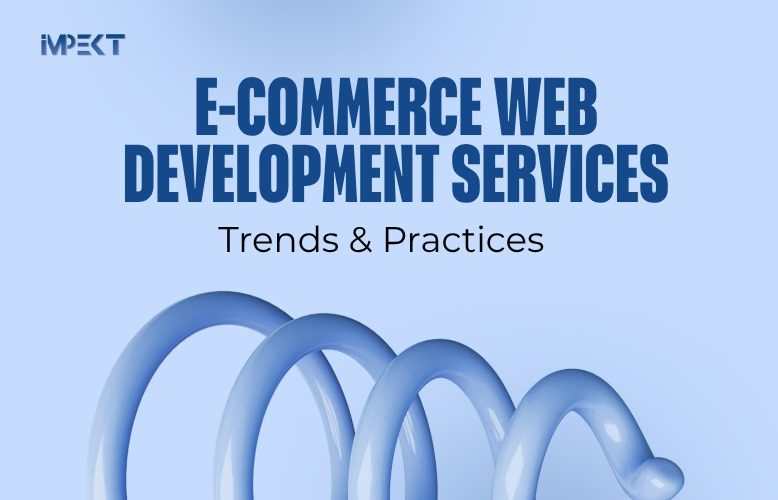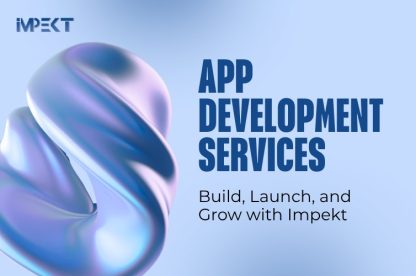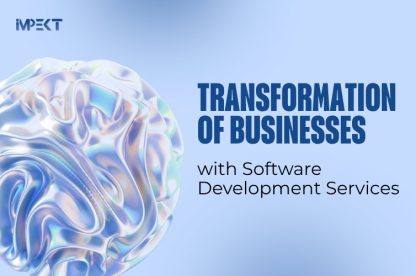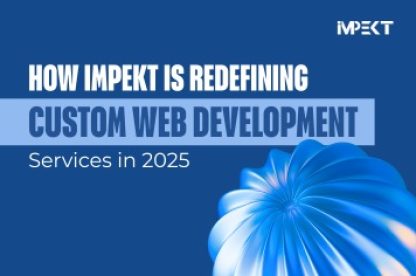London owns the most competitive digital marketplace in the world. To operate your brand in this market, an online store is not sufficient; you have to make it functional, adaptive, and scalable. Trends and technology are evolving every now and then, demanding businesses to stay updated and one step ahead of the market approach.
In this article, we will take you through the most important trends taking shape in the development of e-commerce in London, and provide the best web development services guide. And there is a bit about why Impekt is the one to get all this to happen to your business.
E-commerce Trends in London
The following are trends that are already witnessed in the top London e-commerce brands and applied in web development services:
1. Personalization and AI-based UX
Personalization is not a luxury that London brands are enjoying. AI and machine learning utilize the behaviour of users, recommend products, and personalize content dynamically.
Between chatbots responding in real time to homepages that are customized to the user, the objective is to maximize the interactions and conversions.
2. Progressive Web Apps
Most of the shoppers use their mobile phones to look for the products and sometimes shop for them. It assumes that mobile-first design is non-negotiable. The PWAs, a combination of mobile-app-like speed and offline with web reach, are also being practiced by developers in London.
3. Headless Framework
Websites are made flexible so the frontend can be separated from the backend. The purpose behind this flexibility feature is to use frontend design or make its deployment across new channels without rewriting backend logic. These headless arrangements are becoming common among London companies.
4. AR/VR Feature
Watching the increased features of try-before-you-buy. Wish to know what a chair will look like in your living room? AR overlays are already available in some stores in London. These advancements lower the turnover and increase trust.
5. Voice Commerce
As voice assistants become increasingly widespread at home, people begin to shop via voice recognition. Sites using e-commerce are ready to go by streamlining voice search, creating intelligent chatbots, and incorporating voice-enabled shopping routes.
6. Unified Experience
The consumers in London alternate among physical stores, social media, mobile, and web shopping. Brands are unifying all channels of contact: one cart, shared inventory, uniform messages, and smooth transition.
7. Ethical Business
Consumers are concerned about the environment. The London online retail platforms emphasize green packaging, supply chains, carbon credits and social responsibility sourcing. It is more about brand value than functionality at this point.
8. Security, Privacy & Trust
Protection and compliance of data, such as GDPR, PCI, SSL, etc., has an important meaning for businesses. Companies spend a lot of money to secure information, open a privacy policy, implement encrypted transactions, and provide a reliable UX. A data breach is a killer of reputation.
9. Rapid Delivery & Logistics Innovation
London-based brands prefer and demand the same-day or next-day delivery, intelligent routing, an inventory control system based on machine learning, and micro-fulfillment centers to save time and money on shipping
E-commerce Web Development Services
Being trendy is half the battle. Developers and agencies adopt the following best practices, the ones that distinguish the average sites and high-performing sites.
1. Optimize Speed & Performance
To perform well, websites are optimized by these tactics:
- Take Content Delivery Networks (CDNs)
- Minimize CSS, Javascript, images, and lazy load.
- Use server-side optimizations, HTTP/2, and apply caching.
- Maximize Core Web Vitals (LCP, FID, CLS)
One of the first things that users consider is speed. Slow sites lose people fast.
2. Clean UX/UI
Websites are designed to be the way users find them friendly and interactive.
- Easy-to-use navigation, easy menus.
- Clear calls to action (CTAs).
- Do not use cluttered product pages.
- Breadcrumbs, filters, and search bars are always present.
Allow the user to take a natural flow and not to think too much, which reverses his shopping decision reversed.
3. Optimized Checkout
Multiple payment methods, easy steps, and real-time experience keep the buyer engaged.
- Lessen the procedures; think about a one-page checkout.
- Offer guest checkout.
- Numerous payment methods: cards, wallets, and buy now pay later.
- Well-defined indicators of progress and useful error feedback.
One of the most frequent events in this case is the cart abandonment, rectifying friction, and you will observe a conversion lift.
4. Mobile-Friendly Design
Special attention is given to mobile versions of websites and web apps so that the design would be user-friendly.
- Test across devices and screens.
- Thumb-size buttons.
- No full-page pop-ups that would interrupt the interaction.
- Pay attention to mobile payments and clicks to calls.
Your mobile UX should be more refined than desktop.
5. Ground-Up SEO
Search engines play a crucial role in customer acquisition, and SEO should be embedded in your site’s structure from day one.
- Semantic HTML, opposite headings, and meta tags.
- Products, reviews, structured data (schema).
- Structured URLs, canons.
- Interlinking of the product, category, and blog pages.
SEO is not merely a marketing tool, but it is a development tool.
6. Modular Architecture & APIs
Modern flexible stores are ready to be changed, ensuring maintenance, consistency, and growth.
- Assemble parts that you can recycle.
- Use APIs to make payments, shipping, inventory, and CRM.
- Design in such a way that a replacement of a module does not result in the whole system being broken.
This will be able to future-proof your store and aid in growth.
7. Analytics, Testing, and Monitoring
It is essential to understand user behavior and continually track, test, and adjust strategies to optimize conversions.
- Utilize the tools, such as Google Analytics, heatmaps, and session replay.
- Variations in the test (texts on the buttons, layouts, images)
- Track funnel drop-offs, bounce rates, and conversion rates
- Use information to make designs or copy modifications over time.
Perpetual enhancement is the source of sustainable success.
8. Universal Design
The accessibility must be incorporated and not added. A universal design would provide people with a more improved experience.
- Alt text for images
- Keyboard navigation
- Large contrast fonts are being read.
- ARIA screen reader labels.
A convenient location is both responsible and better in terms of SEO / UX.
9. Strong Security & Compliance
Trust is everything in e-commerce. New websites are developed with security and privacy practices to protect users and brand reputation.
- HTTPS everywhere
- Handling of PCI-compliant payments
- Periodic security testing and updates
- Cookies, transparent privacy policy, GDPR
Security mistakes can be expensive in terms of both revenue and reputation.
10. Plan for Scale
A non-scalable store will get into trouble in the future. Construct it in a manner that it is scalable, adaptive, and can be extended to incorporate additional features without collapsing.
- Use a code that can be maintained
- Make sure that the architecture supports additional products and traffic
- Document design, API endpoints, and logic flows
A store that is not scalable will run into walls soon.
Impekt & E-commerce in London
You might be asking yourself: why not create this personally or contract an unspecialized development firm? This is where Impekt comes in hand with the actual value-adding facet of it all: we are the intermediary between technology & strategy and London market trends.
Local market knowledge: We know the local consumer behavior, legal regulations (like UK payments), and online trends in this market.
Custom solutions: Whether headless or AR functionalities, our websites are not built but developed.
End-to-end service: We design, develop, optimize the performance, and do the SEO, security, etc. We are in charge of the entire web cycle.
Continuous optimization: Trends change; we do not just develop and abandon. Instead, we track, A/B test, revise, and improve.
Credibility and reliability: We comply with the UK laws and data regulations and ensure a high level of security, which makes your customers safe.
Simply put, when you go with Impekt, you do not only have a website to go with, you have a competitive weapon that is geared to the speed of London.
Establish your E-commerce with Us
The web development of e-commerce in London does not stay the same. Customization, headless arrangements, AR/VR, voice commerce, sustainability, and security are some of the trends that will continue to push the boundaries. But it must be based on the fundamentals: speed, UX, SEO, modular architecture, and accessibility.
Just having a site is not enough to compete successfully at the business level; you must take the web development services that can shape, grow, and scale your site and business. That’s what Impekt builds.
FAQ’s
Q1. Enlist e-commerce trends in the London marketplace?
These trends are as follows:
- Personalisation and AI-based UX
- Progressive Web Apps (PWAs)
- Headless Architecture
- AR/VR Feature
- Voice Commerce
- Unified Experience
- Ethical Business
- Security, Privacy & Trust
- Fast Delivery & Logistics Innovation
Q2. What are some new style web development services in e-commerce?
These include: speed & performance optimization, clean UX/UI, checkout optimization, mobile-friendly design, ground-up SEO, modular architecture & APIs, analytics, testing and monitoring, inclusive designs, strong security & compliance, and planning for scalability.
Q3. Why would Impekt be the best choice to develop an e-commerce website?
Because:
- We know the local market knowledge.
- Our websites are developed with custom solutions.
- We offer end-to-end service and continuous optimization.
- We comply with the UK laws and data regulations, giving our customers credible and reliable service.







